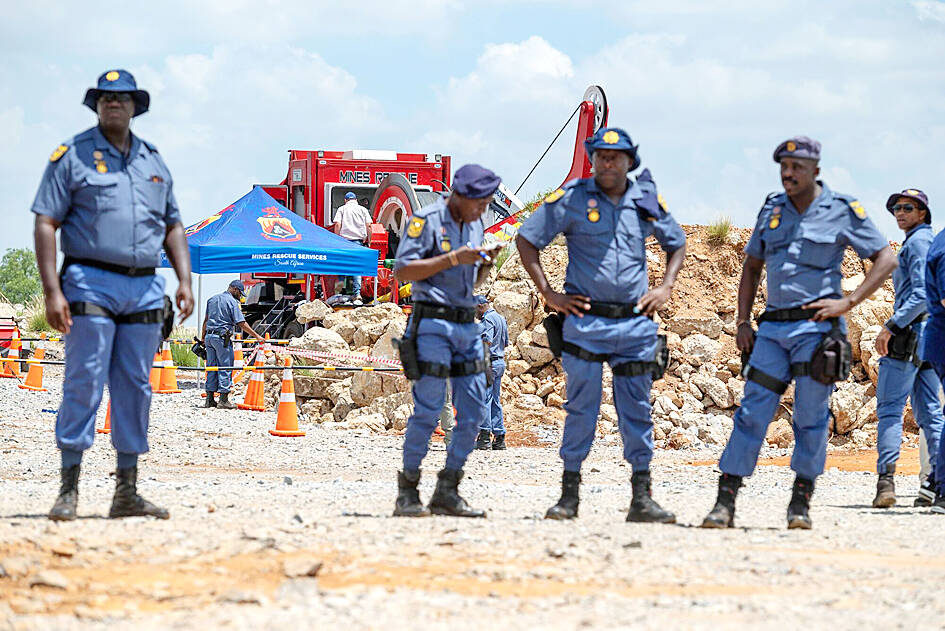South African authorities have pulled at least 60 bodies from the shaft of a closed gold mine more than 2km underground where an unknown number of men are still feared trapped, following a siege in a crackdown on illegal mining.
The siege, which began in August last year at the mine in the town of Stilfontein, about 150km from Johannesburg, cut off food and water supplies for months to force the miners to the surface so that they could be arrested.
On Monday, authorities used a metal cage to begin recovering men and bodies from the shaft, in an operation expected to run for days.

Photo: Bloomberg
“We don’t know exactly how many people are remaining there,” South African Minister of Police Senzo Mchunu told broadcaster eNCA. “We are focusing on getting them, assisting them out.”
It was difficult to say when all the miners would be brought up, he said, adding that “when each one of the miners who are underground went there, no one was counting.”
In a statement, police said 51 bodies had been retrieved by Tuesday night, following nine the previous day.
The 106 survivors pulled from the mine on Tuesday were arrested for illegal mining, swelling the figure of 26 a day earlier, they added.
For decades, South Africa’s precious metals industry has battled illegal mining, which costs the government and industry hundreds of millions of dollars a year in lost sales, taxes and royalties, a mining industry body estimates.
Typically, it is centered on mines abandoned by companies, as they are no longer commercially viable on a large scale. Unlicensed miners, known locally for taking a chance, go in to extract whatever might be left.
The South African government has said the siege of the Stilfontein mine was necessary to fight illegal mining, which South African Minister of Mineral and Petroleum Resources Gwede Mantashe called “a war on the economy.”
However, residents and rights groups have criticized the crackdown, part of an operation called “Close the Hole.”

The Burmese junta has said that detained former leader Aung San Suu Kyi is “in good health,” a day after her son said he has received little information about the 80-year-old’s condition and fears she could die without him knowing. In an interview in Tokyo earlier this week, Kim Aris said he had not heard from his mother in years and believes she is being held incommunicado in the capital, Naypyidaw. Aung San Suu Kyi, a Nobel Peace Prize laureate, was detained after a 2021 military coup that ousted her elected civilian government and sparked a civil war. She is serving a

REVENGE: Trump said he had the support of the Syrian government for the strikes, which took place in response to an Islamic State attack on US soldiers last week The US launched large-scale airstrikes on more than 70 targets across Syria, the Pentagon said on Friday, fulfilling US President Donald Trump’s vow to strike back after the killing of two US soldiers. “This is not the beginning of a war — it is a declaration of vengeance,” US Secretary of Defense Pete Hegseth wrote on social media. “Today, we hunted and we killed our enemies. Lots of them. And we will continue.” The US Central Command said that fighter jets, attack helicopters and artillery targeted ISIS infrastructure and weapon sites. “All terrorists who are evil enough to attack Americans are hereby warned

Seven wild Asiatic elephants were killed and a calf was injured when a high-speed passenger train collided with a herd crossing the tracks in India’s northeastern state of Assam early yesterday, local authorities said. The train driver spotted the herd of about 100 elephants and used the emergency brakes, but the train still hit some of the animals, Indian Railways spokesman Kapinjal Kishore Sharma told reporters. Five train coaches and the engine derailed following the impact, but there were no human casualties, Sharma said. Veterinarians carried out autopsies on the dead elephants, which were to be buried later in the day. The accident site

‘NO AMNESTY’: Tens of thousands of people joined the rally against a bill that would slash the former president’s prison term; President Lula has said he would veto the bill Tens of thousands of Brazilians on Sunday demonstrated against a bill that advanced in Congress this week that would reduce the time former president Jair Bolsonaro spends behind bars following his sentence of more than 27 years for attempting a coup. Protests took place in the capital, Brasilia, and in other major cities across the nation, including Sao Paulo, Florianopolis, Salvador and Recife. On Copacabana’s boardwalk in Rio de Janeiro, crowds composed of left-wing voters chanted “No amnesty” and “Out with Hugo Motta,” a reference to the speaker of the lower house, which approved the bill on Wednesday last week. It is